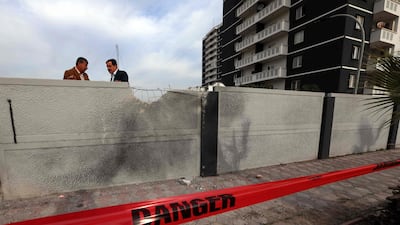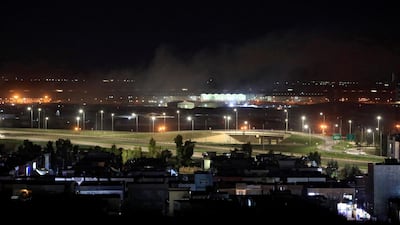Rockets made in Iran were used in an attack on Erbil International Airport on Monday night that killed one civilian contractor and wounded a US serviceman as well as nine others.
At least three rockets were fired at the airport in the semi-autonomous Kurdistan Region of Iraq around 9.30pm on Monday evening, one of which hit a military complex where US-led coalition troops are based, security sources told AFP.
There were several blasts and a fire blazed for a few minutes near the airport, Reuters reported.
Two other missiles hit residential areas near the airport, a source said.
At least two civilians near the airport were among the wounded.
Windows at the airport were blown out. The extent of the damage from the attack was not clear. Flights into and out of the airport were delayed or cancelled on Tuesday morning.
The airport reopened on Tuesday afternoon and flights resumed, authorities said.
READ MORE: Everything we know so far about Erbil attack
It was unclear if the attack was aimed at international forces or the airport.
Kurdistan's interior ministry said counterterrorism, security, and police units immediately launched an investigation after the attack, in coordination with coalition forces.
Officials located a vehicle they suspected the rockets were fired from.
"The vehicle was a Kia and it was located between Erbil and Gwer,"the ministry said.
"Last night’s attack employed the same method and technique used in a previous assault on the Erbil airport," it said.
Monday’s attack was the first time a US military or diplomatic installation was attacked in Iraq in almost two months.
US Secretary of State Anthony Blinken said the US was "outraged" by the attack and vowed to support the investigation.
A group calling itself Saraya Awliya Al Dam claimed responsibility for the attack. Little is known about the group or its capabilities. However, it appears to be one of the dozens of new organisations likely tied to Iran that have emerged and claimed attacks against international forces in Iraq over the last 18 months.
Kurdish intelligence services found Iranian Fajr 1 rockets still intact at the launch site, which was reportedly within the Kurdish region of Iraq.
The Fajr 1 has a short range of around 8km, confirming the view of security sources who told the Associated Press the projectiles had been launched by militia fighters within the boundaries of the semi-autonomous region.
While state-sanctioned militias, some with ties to Iran, operate across Iraq, security inside the Kurdish region is handled by local authorities and the militia would have had to infiltrate the region to carry out the attack with the short-range missile.
Prime Minister Mustafa Al Kadhimi on Tuesday ordered the formation of a committee with authorities in the KRG to investigate the attack.
Iraqi President Barham Salih described the attack as a “terrorist act” that represented a “dangerous escalation”.
"We have no choice but to strengthen our efforts to root out the forces of terror and attempts to plunge the country into chaos," Mr Salih said on Twitter.
It is now a battle between "state and sovereignty against terrorism and outlaws," he said.
Prime Minister of the semi-autonomous Kurdish Region Masrour Barzani also condemned the "terrorist attack," saying that he had held a phone call with Mr Al Kadhimi to discuss the investigation and also spoke with Mr Blinken.
"We agreed to coordinate closely in the investigation to identify the outlaws behind it," he said on Twitter.
The latest attack of many
The attack is just the latest by elements of the Popular Mobalisation Forces, paramilitaries consisting largely of Shiite armed groups formed to fight ISIS alongside government forces in 2014 but often trained and armed by Iran.
In December 2019, a PMF group killed a US contractor in Iraq, sparking a series of American airstrikes and militia retaliation. The US then killed Iranian Quds force head Qassem Suleimani in January 2020 leading to the massive Iranian ballistic missile attack on US bases in Iraq that left dozens of American soldiers with brain injuries but caused no deaths.
War was only narrowly averted when the US decided further escalation could lead to full-scale conflict.
In March 2020, Iran-backed militias killed a US soldier, a US contractor and a British soldier at Taji military camp, north of Baghdad.
Although the PMF are officially a part of the state security forces, they have remained outside of the military chain of command and are regarded as acting at Iran’s behest.
Iraq has found itself caught in the middle of increasing tension between Iran and the US since Washington pulled out the 2015 nuclear deal between Tehran and world powers.
The US under Donald Trump also imposed stringent sanctions on Tehran to try to curtail its interference in the region.
Mr Trump also told Iran on December 24, 2020, that if one American was killed in attacks in Iraq then the US would hold Tehran responsible. "Think it over" he warned.
Western military and diplomatic sites have been the targets of dozens of rockets and roadside bomb attacks since the autumn of 2019, but most of the violence has taken place in Baghdad.
American and Iraqi officials blamed hardline elements of the PMF, including the pro-Iran faction Kataib Hezbollah and Asaib Ahl Al Haq, for such attacks.
These groups are vehemently opposed to the US-led coalition, which has been based in Iraq since 2014 to help local troops fight ISIS.








